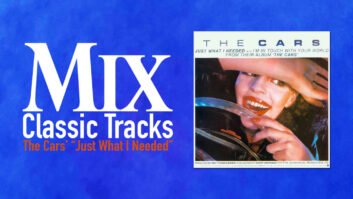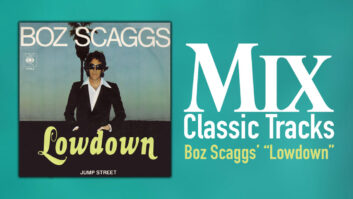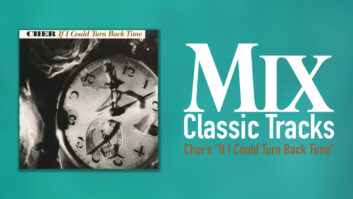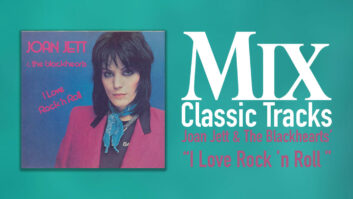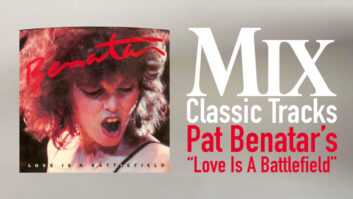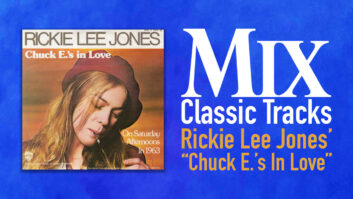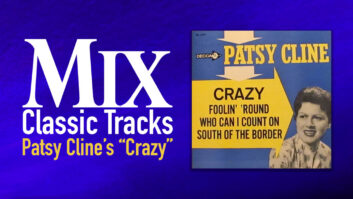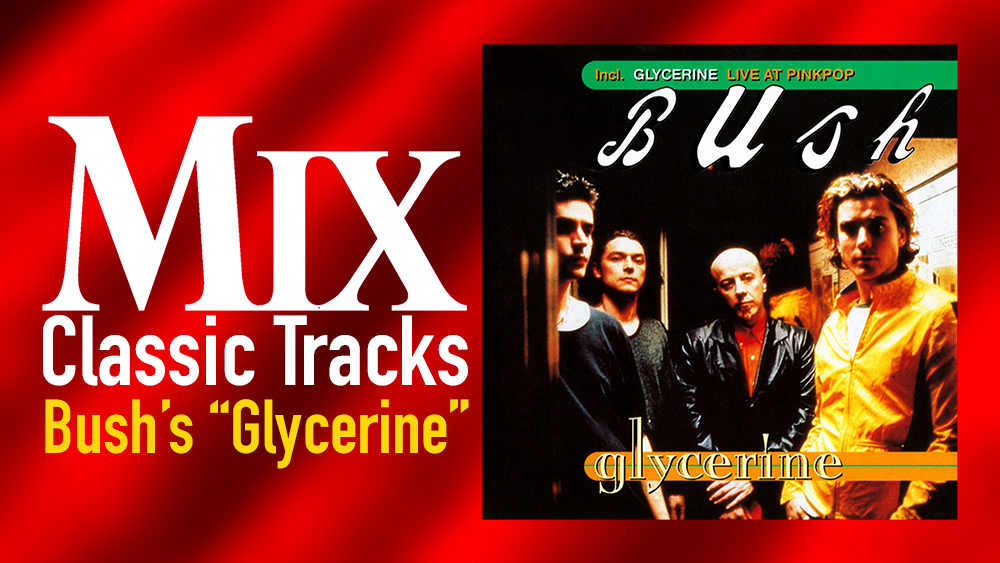
“Am I ripping this off?” thought Bush’s lead singer and rhythm guitarist, Gavin Rossdale, as the song “Glycerine” began to write itself. “Maybe this is someone else’s song,” he recalled thinking, as the music and lyrics continued to reveal themselves so quickly in the basement bedroom of his home at 37 Montigu Square, London, West One.
While Rossdale says he’s not one to describe his work in clichés, like “songs are my babies,” or “they just come through me; I’m just a channel,” this particular song was definitely inspired as he sat on his bed with a big tape recorder on his side dresser and began writing on guitar with a distortion pedal.
The Bush frontman was engaging and enthusiastic as he discussed “Glycerine,” the song he considers the most successful he’s ever written, one where he was in that moment of having a parallel conversation inside the creative conversation. “You reflect on it once you have the shape [of the song],” he explains. “In my life, it’s always been about pushing around my shapes. A guru of mine said writing songs is either easy or impossible, and that’s how it goes. If I’m laboring over something, it’s not right.”
This particular time, however, it came so easily that Rossdale was truly concerned he had stolen someone else’s song.
“You just have these incredible moments; flashes of creativity you are lucky enough to receive and expose and record,” Rossdale explains. “The first step was I played it for the band in a rehearsal room in Harlesden in West London, a super-ghetto rehearsal room, and they were not paying attention. After I played the song, they were still chatting, and I thought, ‘First off, this might be someone else’s, and secondly, if it’s not someone else’s, nobody gets it and can I play it again?’ That’s a band for you; they always beat up the singer!”
The stark production of the track, recorded in January 1994, was released as the fourth single of Bush’s debut LP, Sixteen Stone, on November 14, 1995, and materialized as a result of many variables coming together all at once.
DRUMS OR NO DRUMS?
Rossdale says the demo was just guitar and his vocal. He had never recorded a song without drums, and the intention was to have the band join in. When we spoke, he couldn’t quite remember if the band actually ever did record the song, but says there seems to be a point in the second chorus where the drums sound like they were going to come in, and perhaps they had at one point.
“Alan [Winstanley] mixed it as if the drums were still going to come in,” Rossdale recalls. “That’s what was so genius—and it might be that the drums were there and he just muted them.”
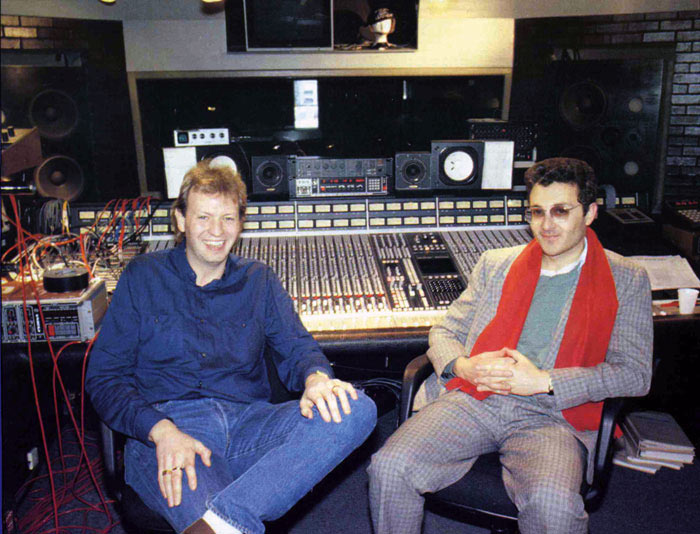
The production team of Clive Langer and Alan Winstanley also needed a minute to recall how the recording of “Glycerine” went down with the band, back in the days when they were still called Future Primitive.
“Someone at the record company found out there was a software company called Future Primitive, so they had to change the name,” Winstanley explains. “They came up with the name Bush, which they said came from Shepherd’s Bush, which is where we recorded the album,” to which Langer adds with a laugh, “It has other connotations as well.”
Winstanley remembers listening to Nirvana and going out and buying records that Rossdale was into, like the Pixies and PJ Harvey, before coming in to work with the band on the album. Both Winstanley and Langer are listed as producers on the record, along with the band. Langer spent more time in the rehearsals helping to shape the material, while Winstanley, the engineer, did more of the heavy lifting during tracking.
“The arrangements were very simple,” Langer says. “We just recorded it. It wasn’t like making a Madness record or a They Might be Giants record, or even an Elvis Costello record. There weren’t that many overdubs. We were purposely keeping it simple.”
“Glycerine” turned out very simple. When I shared Rossdale’s recollection that they may have experimented with a full-band recording on “Glycerine,” it jogged the two producers’ memories.
“I think halfway through, we had the band come in, and maybe we took them out later, but that was near the end,” Langer notes. “I think we tried having bass and drums coming in, but then I think we just didn’t need it. It was poignant, and it would have been a bit bombastic to have them come in.
“We did most of Gavin’s guitars to a Marshall 100, but then we did a track to a Marshall 50, and then we redid all his guitars in a day because it sounded so much better than the Marshall 100,” he continues. “It was a breakthrough. We decided to forget about the double-tracking, just getting down to basics.”
WEST SIDE STUDIOS, LONDON
Winstanley says they started the album in Studio One at West Side Studios, London, which at that time housed a Neve VR console. “Glycerine” was recorded on a 24-track Studer A800 tape machine, with a Neumann U87 at the front of Rossdale’s vocal chain.
“We used the normal kind of limiters and compressors—I think I was using Audio Design Compressors in those days, and I remember that Empirical Labs launched the Distressor that year and we rented one, which I used to compress Gavin’s vocals,” Winstanley says. “I liked that piece of equipment so much we immediately bought two of them for West Side Studios. We didn’t use much effects. The guitars are dry. As for mics, I would have had a Sennheiser 421 and Shure 57, and a bit of a room mic.”
Nigel Pulsford, Bush’s lead guitarist, wrote the arrangements for the overdubbed strings (double-tracked), performed by Gavyn Wright (violin and viola) and Caroline Dale (cello). The viola and violin would have been miked with U87s, with a U47 on the cello and another few as room mics.
“Nigel delivered really beautiful strings,” Rossdale says of the arrangement, which includes the haunting final chords. “His father had just passed away, and he wrote some very, very beautiful strings, and that also informed the decision, ‘Don’t put drums in there now; don’t hide those strings.’ It’s funny how all these different, unusual circumstances happened to bring about what is effectively a ballad with a distorted guitar. People at that point in our career weren’t handing out too many compliments. Still, for me, it’s the most successful song that I’ve ever written.”
Rossdale concedes that had it been done in a traditional manner, it would not have had distorted guitar; it would have had acoustic guitar and power drums in the middle. “What happened? Where did it all go wrong?” he says with dramatic playfulness.
“It was a special song,” Langer adds. “It stood out as something special, like the intro to ‘Machinehead,’ when I think of Bush. The thing is, we made the record as Future Primitive, and then they had problems with their record company, and we didn’t hear anything about it. We thought it was a lost album, and it didn’t come out until a year later. We didn’t have any expectations. It took off really quickly when it finally came out.”
Classic Tracks: Duran Duran’s “Hungry Like The Wolf”
Sixteen Stone, released in December 1994, eventually hit Number 4 on the U.S. Billboard 200 chart, with “Glycerine” reaching the Top 30 on the Billboard Hot 100. In November 2023, the cut was included in a 21-song greatest hits package called Loaded: The Greatest Hits 1994-2023.
“I remember being aware of the potential power of the song,” Rossdale says. “I had no concept of the future; I didn’t know what that meant. I was very naïve. I was in London playing rock music when people didn’t like rock music. There was clearly no commercial endeavor. If I was commercially minded, I would have been studying the Kinks closer like everyone else, or Blur or Pulp. When you look back at them now, all of them, whether you liked them or not, were incredible bands, but they were too tidy for me. I liked more sweat and mess and feedback. I had more rage than that. I let go of all commercial concepts and began Bush.”
And look what happened, I remark. “I know,” he says.

